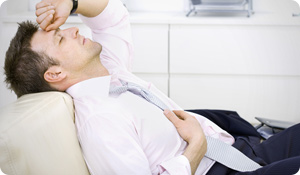
When men think about menopause, thoughts of wives' hot flashes, mood swings, and under-chin peach fuzz usually come to mind. But could it be that, around a certain age, men experience something that resembles the same hormonal changes that women do?
It's a fact that, as men age, levels of testosterone—the "male hormone"—begin to diminish. According to the Mayo Clinic, testosterone levels gradually decline throughout adulthood—averaging about 1 percent a year after age 30. It's important to note that testosterone levels vary greatly from person to person. The term "male menopause," or late-onset hypogonadism or andropause, refers to the consequences of significant testosterone-level drops in men over the age of 50.
Identifying Late-Onset Hypogonadism
In an attempt to find evidence-based criteria for identifying the condition, researchers at the Andrology Research Unit at the University of Manchester, Manchester Academic Health Science Centre, Manchester, United Kingdom, surveyed a random sample of 3369 men between the ages of 40 and 79 at eight European centers. Questionnaires in regard to the subjects' general, sexual, physical, and psychological health and testosterone levels were measured for all participants.
The study found that symptoms of erectile dysfunction, poor morning erection, low sexual desire, depression, inability to perform vigorous activity, and fatigue were significantly related to one's testosterone level.
Symptoms of Late-Onset Hypogonadism
Symptoms of andropause can vary greatly from person to person. The most commonly observed symptoms include:
- Decreased energy
- Decreased libido or interest in sex
- Infertility
- Erectile dysfunction
- Hot flashes
- Night sweats
- Muscle weakness
- Muscle aches
- Sleeplessness
- Depression
- Bone loss
Is It Really Menopause for Men?
The jury is still out on weather late-onset hypogonadism is really a form of menopause. For women, menopause marks the end of ovulation and a significant drop in hormones in a short period of time. For men, though hormone production declines over time, the process is subtler, and there is no physiological end to a bodily process.
Regardless of what nomenclature you choose to use, if you believe you're suffering from the symptoms of late-onset hypogonadism, be sure to visit a physician.





